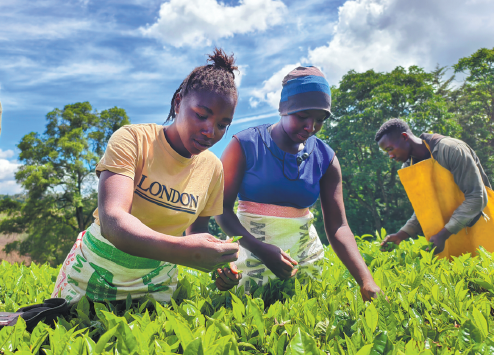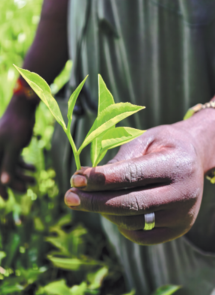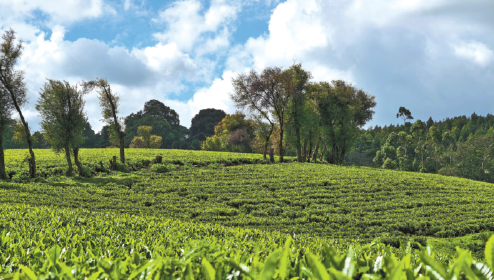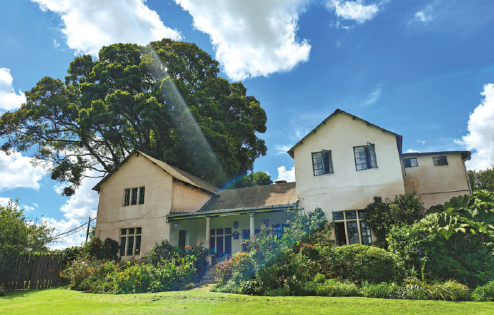Kenya's bush-to-brew tours
Visitors fuel a thriving tea tourism industry in the East African country

Traditionally a major agricultural product for export, tea has increasingly taken on a new role in recent years for Kenya. From the historic tea estates of Kiambethu Farm, pioneering purple tea farm of Gatura Greens to scenic tea plantations of Kericho, this East African country offers tantalizing tea tourism, giving visitors a unique opportunity to understand what makes its brew special.
Kenyan tea has gained popularity across the globe due to its distinct flavor and aroma as well as its bright liquor color, making it a popular choice for tea drinkers and tea blends.
Tours to the farms, therefore, offer visitors an educational experience of understanding Kenyan tea, participating in tea picking, tasting the beverage as well as getting insights into local culture. They can also visit factories to learn about tea processing.
Oldest farm
Located 34 kilometers northwest of the capital Nairobi, on the edge of the Great Rift Valley, about an hour's drive, Kiambethu is the oldest tea farm in Kenya, providing visitors with a glimpse into the early days of tea cultivation in the country. It was established by Arnold Butler McDonell in 1910.
McDonell was the first person to grow, make and sell tea commercially in Kenya, marking the establishment of an industry that currently churns out the country's biggest export product and a major source of foreign exchange. Tea contributes 23 percent of total foreign exchange, according to the Tea Board of Kenya.
McDonell sold his first tea harvest in 1926 to Mabroukie tea factory, marking the beginning of commercial tea production in Kenya. The factory was built by Brooke Bond Kenya in 1924, which played a key role in developing the tea industry in the country through establishing major tea factories and plantations.
In the 1970s, Brooke Bond Kenya expanded its activities to tea estates, factories and hotels and later changed its name to Unilever Tea Kenya.
When McDonell died in 1970, his eldest daughter Evelyn Mitchell took over the management of the farm and introduced guided tours in the 1960s. When she passed away in 1998, her daughter Fiona Vernon followed in her footsteps and carried on with the guided tours to date.
Vernon said over the years, the farm has been downsized from its original 350 acres (142 hectares) through sale and inheritance, to 30 acres, of which two are devoted to tea and 12 are indigenous forest.
A tour of the farm starts at 11 am by having a cup of tea or coffee over which the history of the farm and the process of making tea is outlined.
The visitors then proceed to the tea farm where they are taken through how tea plants are nurtured, how tea is picked, grown, fertilized and pruned. They then come back to the house for another cup of tea or coffee and homemade cookies.
Depending on the weather and the size of the group, the visitors sit in the garden, where they get a description of how tea is processed at the factory.
After that session, visitors are taken for a short walk to the farm's indigenous forest by a Kenyan guide who identifies the plants and explains how they are traditionally used. The tourists can also spot colobus monkeys and a wide variety of birds and flowers.
They then return to the house to enjoy a pre-lunch drink on the verandah with sweeping views of the tea fields and the expanse of the Ngong Hills if the sky is clear. A four-course buffet lunch is then served to conclude the tour.
"We usually offer tours from Thursday to Sunday each week. Sometimes we get 50 visitors," Vernon said, adding that the tour fee is $36 per adult covering tea talks, drinks and lunch, $18 for children aged 12 years and under and free for five-year-olds and below.
She said December to March is the peak season, during which they are sometimes compelled to turn down requests because their online booking system takes a maximum of 40, a number they can comfortably accommodate per day.
Vernon said in addition to local visitors, they receive international tourists from the US, European countries such as Sweden, Norway, Germany and France, China, and Japan.
She said COVID-19 pandemic was their biggest challenge as the number of tourists reduced significantly, terming changing weather patterns as the other.
"Tea production is weather-oriented. If there is inadequate rainfall, the quality of tea is usually poor," Vernon said, adding that the advantage lies in the region's high altitude.
Gatura Greens
Located about 60 kilometers northwest of Nairobi on the slopes of the Aberdare mountains, a 70-minute drive, Gatura Greens is home to the first purple tea farm and a cherished tour that offers an authentic experience, including tasting over 10 different types of tea.
Though agri-tourism started in 2020, the 60-hectare farm's history dates back to 1958, when Bedan Kinyanjui planted his first tea bush, becoming one of the first few black people in Kenya allowed to plant tea for commercial purposes then. In 2008, it became the first commercial purple tea farm in Kenya.
The name Gatura Greens was coined in 2020 when tourism was included, by Cathryn Karanja, Kinyanjui's granddaughter.
After years of tea farming, Karanja said the family felt a need to diversify and expand their offerings beyond just growing and selling tea. That's when the idea of tea tourism was born.
"I studied in South Africa and used to like wine tours and so I pitched that idea to my family. We did a bit of research, went around to see what other Kenyans were doing on agri-tourism and then crafted our own tourism around our tea," Karanja said.
While many businesses were forced to close shop during the COVID-19 pandemic, Gatura Greens saw an opportunity to venture into tea tourism and indeed, business thrived.
"We had an open area and could arrange dining in the garden, so we were permitted to do the tours," she said, adding that business picked up fast because people were desperate for options to get out of home.
She said Gatura Greens tourism is immersive, where visitors get hands-on experience by picking the tea themselves and processing it all the way until it's a finished product, which they keep as a souvenir. Visitors also get an opportunity to taste all types of tea made at the farm's cottage factory.
The tours start at 9:30 am with a breakfast treat of tea and scones, as the host takes them through the farm's history. The guests then head to the purple tea field, where they are guided through the art of tea picking.
This is followed by hands-on processing which involves roasting the delicate tea leaves, hand-rolling, drying, and finally packaging it. They also get an opportunity to taste all the available tea varieties.
The guests then go for a nature walk through a lush bamboo forest, leading them to a waterfall where they can take a refreshing swim, letting the cool waters wash over them as they bask in the natural beauty of the serene haven. The day is then crowned with a farm-fresh three-course meal.
For those who would like to spend the night, there is a farmhouse that offers overnight accommodation for 12 people and a camping ground, that lets the guests experience the gentle rustle of tea leaves as they sleep.
Karanja said plans are underway to increase camping facilities in the farm in response to requests by guests, as well as start hosting retreats. They also plan to expand product range like venturing into purple tea-made cosmetic products.
The tour price is $32 for adults and $15 for children. Residents on the other hand pay $38 per person and $19 for children. Non-residents pay $45 per head while children pay $25. Children under five years are not charged.
The ticket fee covers the tour, lunch and tea tasting at the farm. At the end of the tour, visitors can shop for any farm product that they have liked throughout their experience.
Karanja said per day they take a maximum of 30-40 people and a minimum of four depending on the season and the particular day.
"Our peak season is June, July, and August and non-rainy seasons for Kenyans. Many people visit over the weekends," she said, adding that they have been receiving a lot of company retreats.
Karanja said there is more growth potential for tea tourism in Kenya, urging farmers across the country to try and offer unique experiences in their farms. She also called on tour operators to include agri-tourism in their packages.
Scenic lush
Nestled in the heart of Rift Valley, 256 kilometers southwest of Nairobi, Kericho is home to some of the country's scenic lush and green tea plantations. The region is popularly referred to as "the tea capital of Kenya" due to its vast tea fields. It is also the largest producer of tea in Kenya.
Established at the inception of the tea industry in Kenya in the 1920s, Kericho tea plantation spans vast hectares of land.
Driving through the winding roads, the rolling green hills of the tea plantations create breathtaking picturesque landscapes.
The region offers tourists a thrilling adventure and tranquillity amid nature as they also experience local culture.
There are also many factories in the region where they can visit to learn about tea processing.
Due to the vast tea fields as well as efforts to reduce labor costs and increase efficiency, mechanical tea harvesters are used in Kericho. Hence, visitors can also watch the interesting machine at work and compare it with the conventional way of picking tea by hand.
Kericho Tea Estate was the first tea plantation globally to become Rainforest Alliance Certified.
Kericho is a prime location for tea cultivation in the country due to its ideal climate characterized by warm and temperate conditions, consistent and abundant rainfall, as well as its deep alluvial soil. The region also enjoys a high altitude of 1,500-2,700 meters.
All these characteristics contribute to the high quality and unique taste of the tea produced in the region.
Lipton Tea Gardens and Browns Investments PLC, both United Kingdom-based multinationals, own the largest tea plantations in Kericho covering 14,100 hectares and 12,000 hectares respectively.





Today's Top News
- Xi urges basic research push for original innovations
- Building of rare earth hub highlighted
- Seedance 2.0 signals big shift in AI sector
- Rational scheduling for year's largest film release window
- United front work urged to pool strength
- Beijing refutes US nuclear test accusations






























